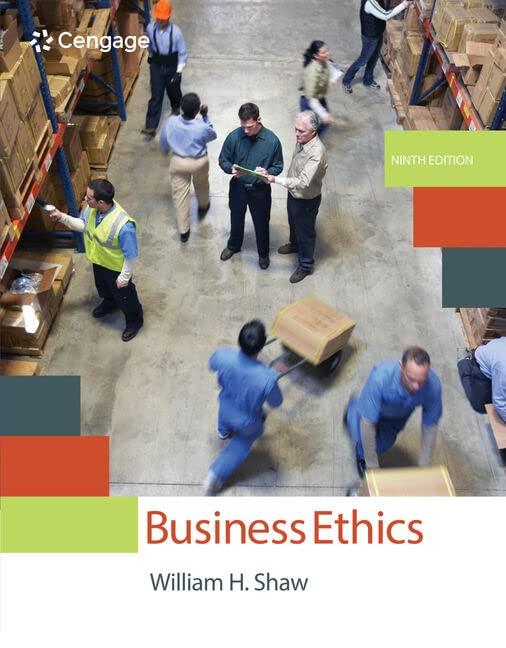SOL LEVIN WAS A SUCCESSFUL STOCKBROKER in Tampa, Florida, when he recognized the potentially profitable market for
Question:
SOL LEVIN WAS A SUCCESSFUL STOCKBROKER in Tampa, Florida, when he recognized the potentially profitable market for safe and uncontaminated blood and, with some colleagues, founded Plasma International. Not everybody is willing to make money by selling his or her own blood, and in the beginning Plasma International bought blood from people addicted to drugs and alcohol. Although innovative marketing increased Plasma International’s sales dramatically, several cases of hepatitis were reported in recipients.
The company then began looking for new sources of blood.21 Plasma International searched worldwide and, with the advice of a qualified team of medical consultants, did extensive testing.
Eventually they found that the blood profiles of several rural West African tribes made them ideal prospective donors. After negotiations with the local government, Plasma International signed an agreement with several tribal chieftains to purchase blood.
Business went smoothly and profitably for Plasma International until a Tampa paper charged that Plasma was purchasing blood for as little as fifteen cents a pint and then reselling it to hospitals in the United States and South America for $25 per pint. In one recent disaster, the newspaper alleged, Plasma International had sold 10,000 pints, netting nearly a quarter of a million dollars.
The newspaper story stirred up controversy in Tampa, but the existence of commercialized blood marketing systems in the United States is nothing new. Approximately half the blood and plasma obtained in the United States is bought and sold like any other commodity. By contrast, the National Health Service in Great Britain relies entirely on a voluntary system of blood donation.
Blood is neither bought nor sold. It is available to anyone who needs it without charge or obligation, and donors gain no preference over nondonors.
In an important study, economist Richard Titmuss showed that the British system works better than the American one in terms of economic and administrative efficiency, price, and blood quality. The commercialized blood market, Titmuss argued, is wasteful of blood and plagued by shortages. In the United States, bureaucratization, paperwork, and administrative overhead result in a cost per unit of blood that is five to fifteen times higher than it is in Great Britain. Hemophiliacs, in particular, are disadvantaged by the U.S. system and have enormous bills to pay. In addition, commercial markets are much more likely to distribute contaminated blood.
Titmuss also argued that the existence of a commercialized system discourages voluntary donors. People are less apt to give blood if they know that others are selling it. Psychologists have found similar conflicts between financial.........
Discussion Questions 1. Is Sol Levin running a business “just like any other business,” or is his company open to moral criticism?
Defend your answer by appeal to moral principle.
2. Did Plasma International strike a fair bargain with the West Africans who supplied their blood to the company?
Or is Plasma guilty of exploiting them in some way? Explain your answer.
3. What are the contrasting ideals of the British and U.S. blood systems? Which system, in your opinion, better promotes human freedom and respect for people? Which system better promotes the supply of blood?
4. Examine the pros and cons of commercial transactions in blood from the egoistic, the utilitarian, and the Kantian perspectives.
5. Are Titmuss and Singer correct to suggest that the buying and selling of blood reduces altruism? Does knowing that you can sell your blood (and that others are selling theirs)
make you less inclined to donate your blood?
6. Singer suggests that although the right to sell blood does not threaten the formal right to give blood, it is incompatible with “the right to give blood, which cannot be bought, which has no cash value, and must be given freely if it is to be obtained at all.” Assess that idea. Is there such a right?
7. Many believe that commercialization is increasing in all areas of modern life. If so, is it something to be applauded or condemned? Is it wrong to treat certain things—such as human organs—as commodities?
8. Do you believe that we have a moral duty to donate blood? If so, why and under what circumstances? If not, why not?
Step by Step Answer:






